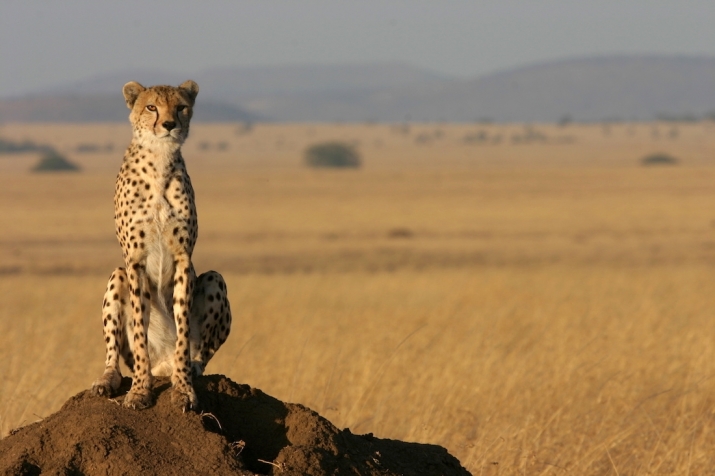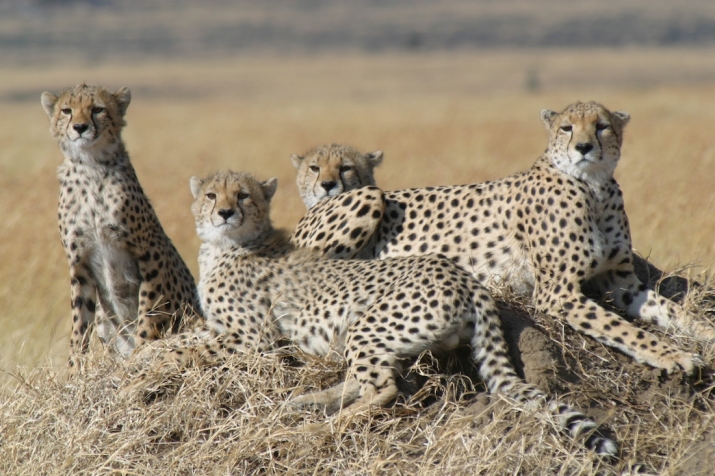NEWS
Scientists Urge Endangered Status as Cheetah's Race to Escape Extinction
 A new study indicates that just 7,100 cheetahs remain in the wild. From panthera.org
A new study indicates that just 7,100 cheetahs remain in the wild. From panthera.orgIt may be the world’s fastest land animal, but even the cheetah’s formidable speed may not enable this majestic animal to outrun extinction, researchers warn, calling for the cheetah to be listed as an endangered species as the world’s population plummets due to habitat loss and other forms of human impact.
A study recently published in the journal Proceedings of the National Academy of Sciences indicates that just 7,100 cheetahs now remain in the wild, down from some 14,000 estimated in the previous comprehensive tally in 1975. Due to the precipitous population decline, which researchers fear could drop by a further 53 per cent over the next 15 years, scientists are urging that the cheetah’s status be elevated from “Vulnerable” to “Endangered” on the International Union for Conservation of Nature’s (IUCN) Red List of Threatened Species.
“Given the secretive nature of this elusive cat, it has been difficult to gather hard information on the species, leading to its plight being overlooked,” said Sarah Durant, lead author of the study and a researcher at the Zoological Society of London and the Wildlife Conservation Society. “Our findings show that the large space requirements for the cheetah, coupled with the complex range of threats faced by the species in the wild, mean that it is likely to be much more vulnerable to extinction than was previously thought.” (The Washington Post)
The famously swift and agile cheetah, capable of accelerating to up to 96km per hour in just three seconds, is mostly found in a single population that ranges across six countries in southern Africa, where they are under pressure as the wide-open grasslands they favor are rapidly disappearing at the hands of human settlers. Because cheetahs are highly mobile predators, ranging far beyond protected parks and reserves, they are increasingly coming into contact with humans, with whom they are competing for both prey and territory, as well as falling victim to illegal traffickers in animal parts and exotic wildlife. According to the Cheetah Conservation Fund, an estimated 1,200 cheetah cubs are known to have been trafficked out of Africa in the past decade—young cheetahs are worth up to US$10,000 on the black market—of which around 85 per cent died in transit.
“Cheetahs are facing a double whammy: they are getting killed directly, and then also their prey species are getting killed in these savannah areas, so the cheetahs having nothing to subsist on,” said Luke Hunter, president and CCO of global wild cat conservation organization Panthera. “These large carnivores, when they are declining at that sort of rate, then extinction becomes a real possibility.” (National Geographic)
The report, led by Zoological Society of London, Panthera, and the Wildlife Conservation Society (WCS), states that the cheetah has been driven out of 91 per cent of its historic range. The grim findings also reveal that in Zimbabwe alone, the population of cheetahs has dropped from 1,200 just 16 years ago to a maximum of 170 animals today—a loss of 85 per cent, while the Asiatic cheetah has essentially already been wiped out, with fewer than 50 individuals remaining in one isolated pocket of Iran.
The elevated conservation status, the researchers say, would provide more opportunities to attempt to reverse the population decline, by providing access to funding streams that are available only to endangered species and allowing for dialogue and cooperation with African governments on cheetah conservation initiatives.
“What we are really hoping is this will catalyze action to start thinking outside the box for cheetah and landscape conservation, to start looking beyond the protected-area system and looking at how we can get communities engaged in and supportive of conservation, and make sure we have the policy and financial policy framework in place so that they will benefit from conservation,” said Durant. (National Geographic)
 According to the Cheetah Conservation Fund, an estimated 1,200 cheetah cubs are known to have been trafficked out of Africa in the past decade. From panthera.org
According to the Cheetah Conservation Fund, an estimated 1,200 cheetah cubs are known to have been trafficked out of Africa in the past decade. From panthera.org“We’ve just hit the reset button in our understanding of how close cheetahs are to extinction,” said Dr. Kim Young-Overton, director of Panthera’s Cheetah Program. “The take-away from this pinnacle study is that securing protected areas alone is not enough. We must think bigger, conserving across the mosaic of protected and unprotected landscapes that these far-ranging cats inhabit, if we are to avert the otherwise certain loss of the cheetah forever.” (Panthera)
See more
The global decline of cheetah Acinonyx jubatus and what it means for conservation (Proceedings of the National Academy of Sciences)
Sprinting Towards Extinction? Cheetah Numbers Crash Globally (Panthera)
Cheetahs Are Dangerously Close to Extinction (National Geographic)
Cheetahs heading towards extinction as population crashes (BBC)
Cheetahs are racing toward extinction (The Washington Post)
Related news from Buddhistdoor Global
Buddhist Monk Wins Wildlife Service Award
Even Christmas Is Not Immune to Climate Change; Scientists Warn of Shrinking Reindeer
World’s Largest Marine Wildlife Sanctuary Created in Antarctica
New Report Shows Snow Leopards Under Grave Threat from Poaching
New Wildlife Reserve Could Help Save China’s Big Cats
Related features from Buddhistdoor Global
Palri Buddha Park - A Conservation Project in East Bhutan
Significance of Nature in Buddhism
Perspectives: The Buddha's Law Among the Birds














